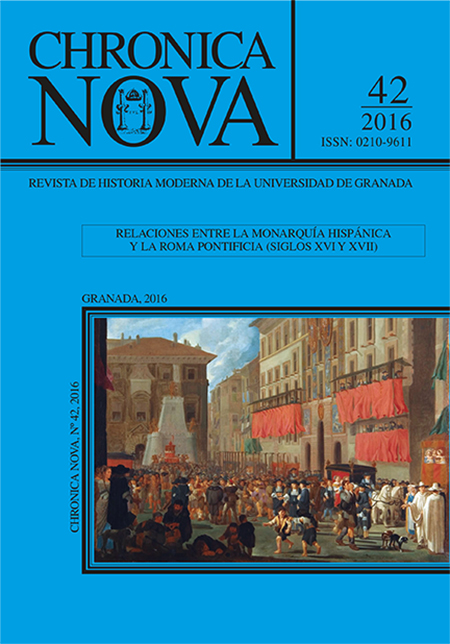The Canonization of Ignatius of Loyola (1622): conflict of interests between Rome, Madrid and Paris
DOI:
https://doi.org/10.30827/cn.v0i42.5016Keywords:
Ignatius of Loyola, holiness, The Sacred Congregation of Rites, Hispanic Monarchy, Papacy, French Monarchy.Abstract
The canonization of Ignatius of Loyola symbolized the triumph of a new model of spirituality; reflecting the same one as Felipe Neri, Teresa of Jesus and Francis Xavier, canonized all together in block —with Isidro Labrador— in 1622. Such type of canonization had no precedents. but, apart from the spiritual model, the canonization of the founder of the Society of Jesus meant the glorification of a new political project that will be discussed in the following pages: the support of Rome to the French monarchy, newly converted to Catholicism, which was presented as the sole protector of the Society of Jesus, founded by Ignatius. Thus, the papacy created an image of San Ignacio breaking all the ties with the Hispanic Monarchy.Downloads
Downloads
Published
How to Cite
Issue
Section
License
Nuestra revista se atiene a las recomendaciones para la implementación del Artículo 37 Difusión en Acceso Abierto de la Ley de la Ciencia, la Tecnología y la Innovación:
- Los/as autores/as cuyas contribuciones sean aceptadas para su publicación en esta revista conservarán el derecho no exclusivo de utilizar sus contribuciones con fines académicos, de investigación y educativos, incluyendo el auto-archivo o depósito de los artículos aceptados en repositorios institucionales o temáticos de acceso abierto de cualquier tipo en un plazo máximo de seis meses.
- Preferiblemente se permitirá el uso de la versión publicada de las contribuciones científicas, que estarán accesibles en abierto tan pronto como sea posible.
-
Que en caso de que el trabajo sea aprobado para su publicación, el/la autor/a autoriza de manera ilimitada en el tiempo a la entidad editora para que incluya dicho texto en Chronica Nova y pueda reproducirlo, editarlo, distribuirlo, exhibirlo y comunicarlo en el país y en el extranjero por medios impresos, electrónicos, CD, Internet o cualquier otro medio conocido o por conocer.






 ISSN-e: 2445-1908
ISSN-e: 2445-1908










